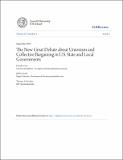The New Great Debate about Unionism and Collective Bargaining in U.S. State and Local Governments
Author(s)
Kochan, Thomas Anton; Lewin, David; Keefe, Jeffrey
DownloadKochan_The New Great Debate about Unionism and Collective Bargaining in.pdf (216.9Kb)
PUBLISHER_POLICY
Publisher Policy
Article is made available in accordance with the publisher's policy and may be subject to US copyright law. Please refer to the publisher's site for terms of use.
Terms of use
Metadata
Show full item recordAbstract
Recently some state and local governments in the United States have sharply reduced or eliminated employee unionism and bargaining rights in the belief that their fiscal adversity stems mainly from overcompensation of public employees caused by collective bargaining. The authors examine public-private sector pay and benefit relationships, the effects of unions on public employee pay, the effectiveness of employment dispute resolution procedures, and the ability of public sector labor and management to combat fiscal adversity. They provide evidence showing that: on balance, public employees are undercompensated relative to their private sector counterparts; the effects of unions on compensation are smaller in the public than in the private sector; and public sector dispute resolution procedures and joint labor-management initiatives to reform work function reasonably well.
Date issued
2012-09Department
Sloan School of ManagementJournal
ILR Review
Publisher
Cornell University
Citation
Lewin, David, Jeffrey Keefe, and Thomas A. Kochan. "The New Great Debate about Unionism and Collective Bargaining in U.S. State and Local Governments." ILR Review, 65(4), October 2012. © Cornell University.
Version: Final published version
ISSN
0019-7939
2162-271X